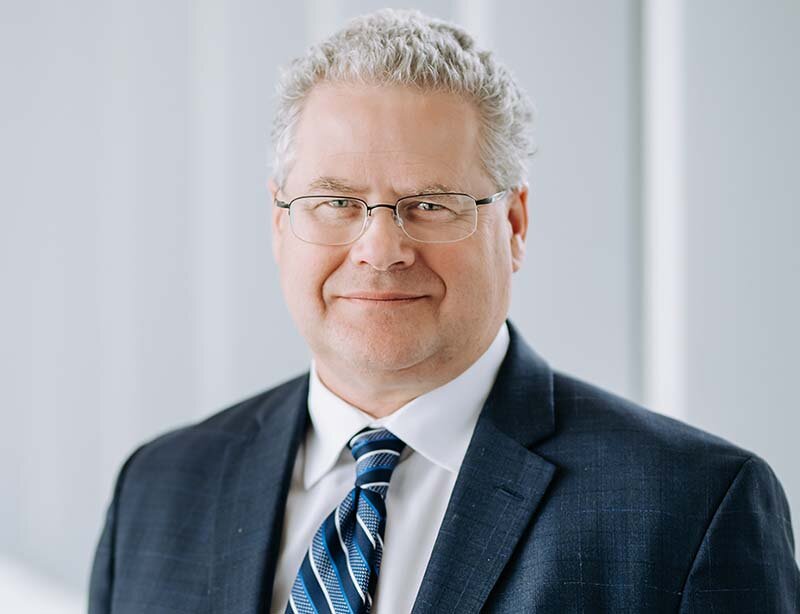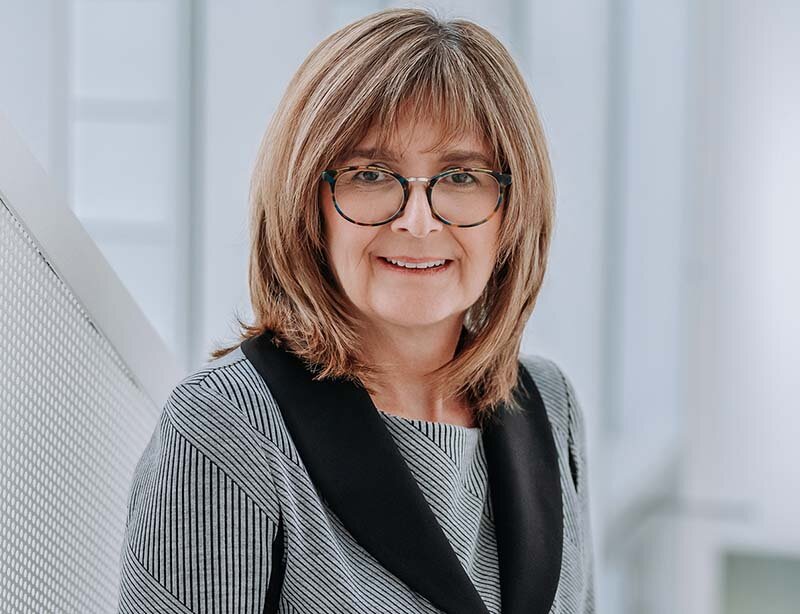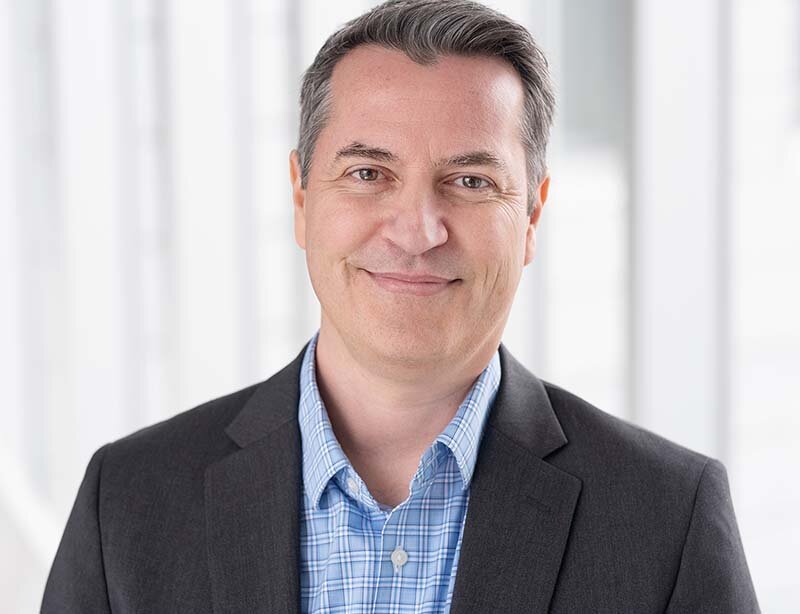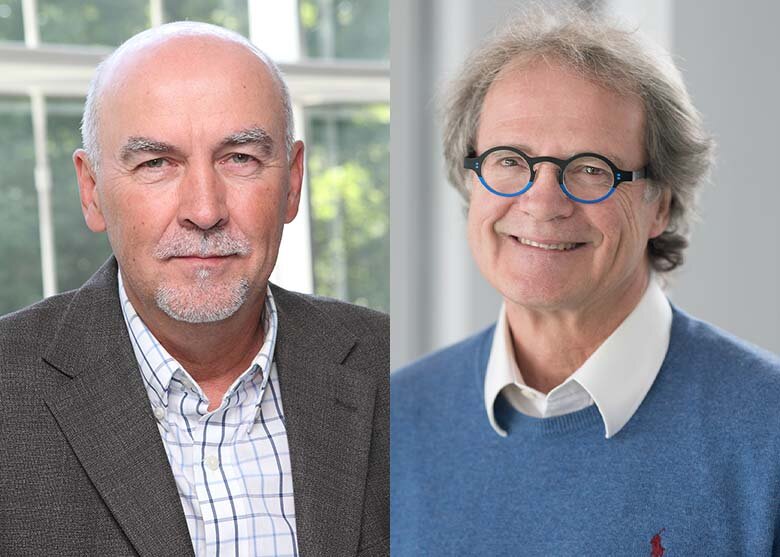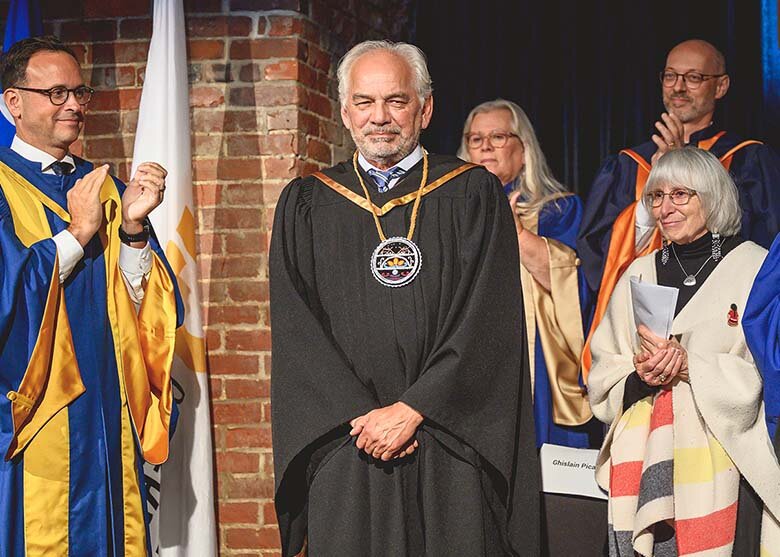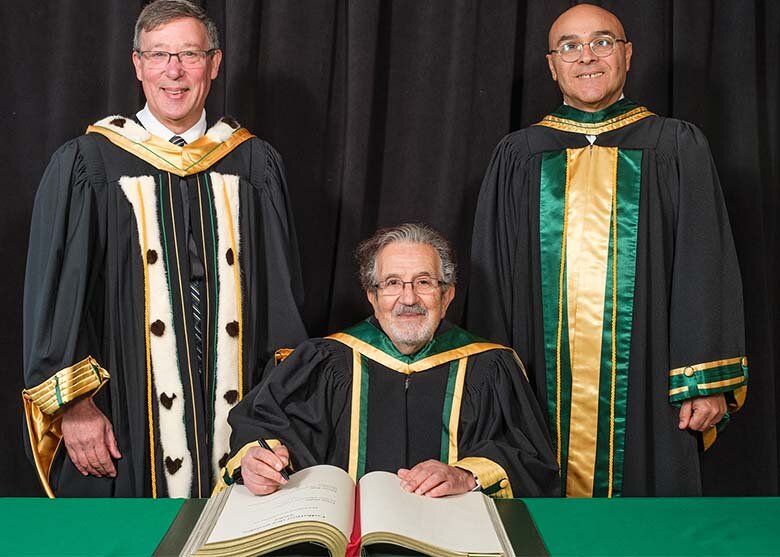Faculty
HEC Montréal: Serving entrepreneurship and economic development in Quebec
April 12, 2016
Are you interested in learning more about how HEC Montréal is supporting entrepreneurship and economic development in Quebec? Read the speech given by HEC Montréal Director Michel Patry to the Board of Trade of Metropolitan Montreal on April 12:
“ […] I have one wish today: I’m hoping that by the end of this luncheon we will all share the same certainty. It’s something I’ve been certain of myself for many years now: only by innovating can our society successfully meet the huge challenges facing us.
Whether the goal is to improve the efficiency of our healthcare system, to combine economic development with environmental conservation, or to keep our organizations competitive in the face of the new globalization, I’m convinced that you share my sentiment that simply injecting more resources is no longer enough. We have to do things differently.
We have to invent new ways of collaborating, new kinds of jobs and new approaches. In short, the key words are innovation, entrepreneurship and change management. That is the challenge confronting current and future business leaders and managers.
And it is largely up to business schools – like HEC Montréal – to prepare these leaders and managers to take on this task and help them hone their skills.
My friends, HEC Montréal is determined to meet this challenge, just as it has already been doing for over a century! A university, given its mission, naturally finds itself in the forefront of major social transformations. Even better, it plays an active part in these changes.
Over time, HEC Montréal has constantly adapted its teaching and launched more and more research initiatives to meet evolving social demands. The School has always remained close to the needs and expectations of its students, first of all, but also to those of business leaders. In that connection, I would note the launch of our new École des dirigeants, which trains close to 8,000 executives a year.
HEC Montréal has also played a leadership role in offering free online courses, in association with our friends and partners at the Université de Montréal and Polytechnique Montréal. I am very proud to mention that our EDUlib platform was the first in the world to offer this type of management courses in French.
In short, the School has always made it a point of honour to focus on innovation in every form in everything it does, from integrating laptop computers into our programs in the 1990s to introducing multilingual programs and encouraging students to gain valuable first-hand international experience.
*
* *
But I know that I’m preaching to the choir on this. You are the first to realize that the world of business and markets is evolving at unprecedented speed. You know that to remain competitive and to grow, you have to constantly innovate and adjust your business model.
Although the need to innovate applies in all fields of management, I would like to focus today on four fields in which HEC Montréal has concentrated as a way of supporting innovation:
• entrepreneurship and management of innovation
• finance and risk management
• the digital revolution
• public policy and governance
Let’s start with entrepreneurship and management of innovation. I don’t think I need to emphasize how critical it has become to invest in entrepreneurship in Quebec, as it is a driver of our collective wealth. This entrepreneurship takes many forms and has many names today, from company start-ups to business transfers – a major issue in Quebec – to social entrepreneurship.
The School is deeply involved in each of these forms, with the enthusiastic support of many partners. Our initiatives are aimed at fostering entrepreneurship through educational activities and training, conducting and sharing the findings of cutting-edge research, and coaching, networking and incubating entrepreneurial initiatives.
The National Bank is one of these key partners and allies in our efforts to foster entrepreneurship. Thanks to a major donation as part of the Campus Montréal campaign, the Bank made it possible to create the National Bank | HEC Montréal Institute for Entrepreneurship, the centrepiece of our entrepreneurial ecosystem.
We have also developed a special track available to all our students, thanks to a generous donation from Rémi Marcoux, a business leader and proud HEC Montréal alumnus.
And last fall, the School announced the creation of entrePrism, a program for young entrepreneurs from cultural communities in Quebec, this time thanks to a donation from the Fondation Mirella et Lino Saputo. The entrePrism program will also receive support from the Quebec government.
Lastly, we very recently created the Deschênes |Molson |Lesage Family Business Centre, with the backing of Jacques Deschênes, Andrew Molson and Claude Lesage.
I’m sure I don’t need to remind you that in North America, and around the world as well, family businesses are the most common type of enterprise. They represent over 80% of Canadian companies and generate more than 60% of the country’s GDP. So you can see just how important they are!
But innovation also has requirements in terms of management. That’s why HEC Montréal founded Mosaic, an innovation and creativity incubator. Its mission is to improve organizations’ innovation processes by means of structured and proven coaching methods. Mosaic helps small, medium and large businesses in Quebec, as well as in a half dozen other countries, meet the challenge of innovation and creativity.
As you can see, while entrepreneurship has been a central concern of HEC Montréal since the very beginning, in recent years we have been trying to step up the pace and make our initiatives more visible and coherent. We have accomplished this thanks to the help of a vast network of business partnerships.
*
* *
The second field I want to talk about is finance and risk management in the context of our globalized economy. This industry, as we all know, is a strategic one for Montreal and Quebec as a whole. It represents over 100,000 jobs. Thanks to the efforts of Finance Montréal, we know that our city is ranked 18th on the Global Financial Centre Index. We also know that Montreal is well positioned to defend certain niche markets in the industry.
In this context, the School decided to devote considerable resources and efforts to strengthening capabilities in three areas: derivatives and risk management; portfolio and pension fund management; and co-operative finance.
Montreal holds an enviable position when it comes to derivatives, thanks to the expertise of the Montreal Exchange as part of the TMX Group. To preserve and develop this expertise and to continue innovating in this field, it is essential that Quebec produce financial experts with the most advanced knowledge. And it is just as essential that our universities continue their research into the development, valuation and regulation of these derivatives. This is what led the School to create the Montreal Institute of Structured Finance and Derivatives, also known by its French acronym, IFSID.
The Institute, with financial support from the Autorité des marchés financiers, the Quebec Ministère des Finances and private partners, brings together experts from several universities and draws on the vital expertise of its partners to develop training programs and advance research into complex financial products. Since 2012, the Institute has trained nearly 1,000 professionals from about forty companies, in addition to supporting some sixty researchers in the field of finance. And we’re just getting started!
In that same spirit, I’d like to announce that in the next few months the School will be creating an Institute on savings and retirement. Its mission will be to co-ordinate our teaching, research and knowledge transfer efforts in the area of portfolio and pension fund management.
The Institute will identify best practices in this area and inform public policy in order to encourage governments and individuals to make socially optimal savings and investment decisions.
Another partner, who needs no introduction in Quebec, allowed us to create the Alphonse and Dorimène Desjardins International Institute for Cooperatives, which focuses specifically on financial services cooperatives. The Mouvement Desjardins wanted to give HEC Montréal the means to become a global research hub on financial cooperative management, and we are very grateful.
To conclude on this theme, I firmly believe that Montreal can and must remain a dynamic hub and a Canadian and international reference in finance. But to do so we have to continue to build partnerships between universities and between the university and financial communities.
*
* *
The third field I want to talk about today is the digital revolution. Most experts agree that our society is on the cusp of a transformation that will radically change how we live, work and collaborate. While the precise shape of this transformation remains unclear, many of its features are already apparent.
For instance, think of the development of artificial intelligence and robots, the Internet of objects, innovative manufacturing, 3D printers and big data processing. Each of these developments is a powerful agent for transforming organizations, markets and governments.
I am convinced that, in this context, our companies are at a crossroads: either they can take the initiative, and succeed by integrating these new technologies, or they will soon be threatened and even in danger of disappearing.
As a business school, our job is of course to give managers the tools they need to address these transformations and understand how they will influence business models and how markets operate. But even more important, we have to be a part of these changes, by helping companies become more agile and transform themselves. Lastly, it is up to us to evolve our own organization and teaching methods to derive the most from this digital revolution. In short, in this case too, we have to innovate.
Now, Montreal is not short of resources when it comes to the digital revolution. It has a strong information technology sector, and impressive abilities in the area of big data. This was highlighted in a recent report prepared by Montréal International.
Exploiting the potential of big data is part of the innovative practices that will help companies become more competitive, and has applications in all fields of management, from finance to marketing, logistics, operations management, human resources management, and more.
For many years now, HEC Montréal has been working on developing new management tools to help exploit big data. That's why terms like business intelligence, financial engineering and business analytics are part of our everyday vocabulary.
In fact, in a joint effort with our partners at the Université de Montréal and Polytechnique Montréal, the School created the Institute for Data Valorization, or IVADO, bringing together over 150 researchers and more than 500 graduate students from our three institutions. The IVADO is now one of the world’s leading centres of expertise on big data and operational research, alongside MIT, in Boston, and the Georgia Institute of Technology, in Atlanta. And we are delighted that many companies, like Hydro-Québec, CAE, Cogeco, Gaz Metro, the Caisse de dépôt et placement du Québec and Air Canada were quick to come on board and invest in the Institute.
Another very recent development is the expansion of HEC Montréal’s Tech3Lab, now the largest laboratory specializing in the study of the user experience in North America. Its research helps to better understand and optimize the technological interfaces used by citizens, consumers and employees in different industries.
Its findings often have very immediate and concrete applications. For example, readers of La Presse+ benefit from Tech3Lab expertise every day, since the lab’s researchers helped to optimize the media platform when it was being developed. Companies like SAP, Desjardins and Sobeys are now Tech3lab research partners, showing how strategically important they consider the user experience to be.
As for our own organization, we have already introduced many innovations in recent years, like the development of EDUlib, hybrid courses, serious gaming and the flipped classroom approach, which encourages wide-ranging classroom discussions between professors and students.
We have also launched a vigorous discussion about how we can reinvent our teaching approaches to make the most of mobility, enhance access to digital resources and co-create knowledge with our students. As you can see, even the university world is changing!
*
* *
Lastly, the fourth field I want to mention, to show how our School is serving society and helping to innovate, is public policy. In recent years, HEC Montréal has supported many governance renewal initiatives. I would like to tell you about three of them.
The Institut du Québec, created as the fruit of a partnership between the Conference Board of Canada and HEC Montréal two years ago, produces studies that inform and provide input for public policy debates. Some of the recent studies produced by the Institute have covered the agri-food industry in Quebec, electronic commerce and the mutual funds industry.
To shed more light on energy-related and environmental issues, we launched the Chair in Energy Sector Management. Relying on a fact-based approach and rigorous research, the Chair contributes to the discussion on major energy issues, ranging from the transportation of petroleum products to the ramifications of COP21 for Quebec and all of Canada.
Another major initiative by the School’s experts, supported by the Quebec government, was the founding of the Centre for Productivity and Prosperity in 2009. The very prolific Centre – you’re probably familiar with its annual ranking of Quebec municipalities and its annual overview of productivity in Quebec – provides public decision-makers with analyses and rigorous data.
The Centre in fact sounded an alarm this winter. Its 2015 overview showed that the education sector in Quebec is in a precarious, unenviable and frankly worrisome position. Its researchers found that the Quebec university enrolment rate, for ages 18 to 34, was 13% in 2012, within the Canadian average but far below the 17% in Australia, Denmark and Norway, or the 19-20% in the United States and the Netherlands. And many of these countries have set even more ambitious targets!
Another point of comparison, at a time when economic development will necessarily be driven by our major urban agglomerations, is that about one-quarter of Montrealers are university educated, as compared with 34% in Vancouver and 37% in Toronto. In cities like Boston, San Francisco and Washington, the figure is closer to 50%! And yet Montreal remains the university capital of Canada. With its 155,000 students, 15% of them from abroad, the Montreal region accounts for 65% of all university students in Quebec.
Imagine for a moment what will happen once companies here truly grasp the full potential of new technologies, artificial intelligence, big data, robotization and so on. More than ever before, they will need the knowledge and human capital that our universities are responsible for developing.
Then, on the other hand, just think for a minute what our economic future will look like if our companies and our governments miss this shift and don’t manage, or manage too late, to exploit the full potential of these new technologies.
*
* *
I can assure you that we at HEC Montréal are dedicated to reducing this university education gap, which undermines our economic vitality. And we are convinced that our businesses’ competitiveness and our community’s prosperity are closely tied to our ability to innovate.
The most successful societies – in economic, social and cultural terms – in the coming decades will be those that are able to reinvent themselves and make the most of the incredible potential of this new environment. I firmly believe that these societies are the ones that will make education and innovation a real mantra. That’s why I believe it is urgent that we in Quebec start talking differently about universities and higher education.
While the university system in Quebec is not perfect, there is no question but that it has served us remarkably well since the Quiet Revolution, allowing us to step boldly into the modern world. And that system remains today, more than ever before, an essential and central player in ensuring our development.
Ladies and gentlemen, allow me to insist: there is an urgent need to renew interest in our universities and reorient the discussion about them. And we have to focus this conversation on the key objectives that we want universities to fulfil, and the means we give them to bolster the capacity of our businesses and our governments to master the knowledge they need and to innovate.
In closing, I hope that my themes of entrepreneurship and innovation, finance, the digital revolution and public policy have helped you appreciate the extent to which the development of our businesses, our universities and our society are inseparable. And that leads me to ask you a very simple question: ‘How can we help YOU today?’
If you are not already calling on the innovative spirit and expertise of HEC Montréal’s professors, researchers and students, I urge you to do so without delay. Let us work together to explore the different ways we can collaborate so as to help your organization become more entrepreneurial and innovative. For at HEC Montréal, serving entrepreneurship and economic development in Quebec is what we do best!”
Photo: Pierre Roussel – Agence Québec Presse


